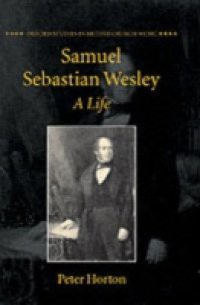Born into one of England's best-known families, Samuel Sebastian Wesley (1810-76) was not only the foremost organist and church musician of his generation, but a vigorous campaigner for higher standards in cathedral music. He was also a troubled, difficult character, and accounts of his abrasive personality or anecdotes about his fishing exploits have tended to obscure his very real achievements as a composer. Peter Horton has drawn on a wide range of source material to produce a detailed account of Wesley's life and career as he moved from cathedral to cathedral in search of an unattainable ideal, his youthful idealism gradually giving way to the cynicism and disillusion familiar to those who encountered him late in life. He also examines his development as a composer and presents a study of his complete output (including the many non-church works) against the background of his restless career andin a wider European context. The book is illustrated by a generous selection of musical examples and plates, and includes the most detailed list of works to appear in print.

